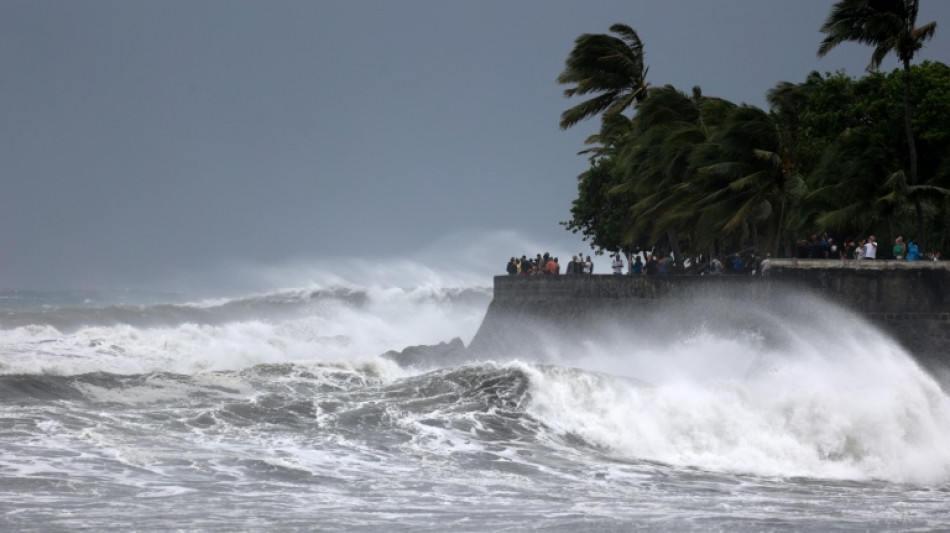
-
 Iran-US talks expected Thursday despite fears of strikes
Iran-US talks expected Thursday despite fears of strikes
-
Milan beaten by Parma, Napoli rage at officials

-
 Hughes looses teeth then scores Olympic gold-winning goal for USA
Hughes looses teeth then scores Olympic gold-winning goal for USA
-
Eze and Gyokeres destroy Spurs to boost Arsenal title bid

-
 Arsenal's Eze sinks Spurs again, Liverpool late show floors Forest
Arsenal's Eze sinks Spurs again, Liverpool late show floors Forest
-
Galthie praises France lock Meafou and defence

-
 'Nothing was good', says Mac Allister despite Liverpool win
'Nothing was good', says Mac Allister despite Liverpool win
-
USA defeat Canada for Olympic men's ice hockey gold, Trump celebrates

-
 EU 'expects' US to honour trade deal as Trump hikes tariffs
EU 'expects' US to honour trade deal as Trump hikes tariffs
-
'GOAT' battles to top of N. America box office

-
 South Africa thrash India to end 12-match T20 World Cup win streak
South Africa thrash India to end 12-match T20 World Cup win streak
-
Bielle-Biarrey breaks record as France beat Italy in Six Nations

-
 US says trade deals in force despite court ruling on tariffs
US says trade deals in force despite court ruling on tariffs
-
Barcelona back top of La Liga with Levante win

-
 Gu strikes gold, USA beat Canada in men's ice hockey
Gu strikes gold, USA beat Canada in men's ice hockey
-
What's behind England's Six Nations slump?

-
 Napoli rage at officials after loss at Atalanta
Napoli rage at officials after loss at Atalanta
-
Liverpool late show floors Nottingham Forest

-
 Rimac Nevera R: Beyond imagination
Rimac Nevera R: Beyond imagination
-
USA beat Canada to win men's Olympic ice hockey gold

-
 Samardzic seals comeback win for Atalanta over Napoli
Samardzic seals comeback win for Atalanta over Napoli
-
Eileen Gu switches slopes for catwalk after Olympic flourish

-
 Luce: Ferrari's ingenious electric revolution
Luce: Ferrari's ingenious electric revolution
-
Miller guides South Africa to 187-7 against India

-
 Scotland boss 'proud' of comeback Six Nations win over Wales
Scotland boss 'proud' of comeback Six Nations win over Wales
-
Iranian students rally for second day as fears of war with US mount

-
 US Secret Service kills man trying to access Trump Florida estate
US Secret Service kills man trying to access Trump Florida estate
-
Coventry 'let the Games do their magic': former IOC executives

-
 Cayenne Turbo Electric 2026
Cayenne Turbo Electric 2026
-
Sri Lanka have to qualify 'the hard way' after England drubbing

-
 Doris says Six Nations rout of England is sparking Irish 'belief'
Doris says Six Nations rout of England is sparking Irish 'belief'
-
Thousands of pilgrims visit remains of St Francis

-
 Emotional Gu makes history with Olympic freeski halfpipe gold
Emotional Gu makes history with Olympic freeski halfpipe gold
-
Impressive Del Toro takes statement victory in UAE

-
 Gu wins triumphant gold of Milan-Cortina Olympics before ice hockey finale
Gu wins triumphant gold of Milan-Cortina Olympics before ice hockey finale
-
England rout Sri Lanka for 95 to win Super Eights opener

-
 Underhill tells struggling England to maintain Six Nations 'trust' as Italy await
Underhill tells struggling England to maintain Six Nations 'trust' as Italy await
-
Alfa Tonale 2026: With a new look

-
 BMW 7 Series and i7: facelift in 2026
BMW 7 Series and i7: facelift in 2026
-
Eileen Gu makes history with Olympic freeski halfpipe gold

-
 Eileen Gu makes history with Olympic halfpipe gold
Eileen Gu makes history with Olympic halfpipe gold
-
Morocco flood evacuees mark muted Ramadan away from home

-
 Lucid Gravity 2026: Test report
Lucid Gravity 2026: Test report
-
Sri Lanka restrict England to 146-9 in T20 World Cup Super Eights

-
 West Indies wary of Zimbabwe's 'X-factor' quick Muzarabani
West Indies wary of Zimbabwe's 'X-factor' quick Muzarabani
-
Bentley: Visions for 2026

-
 Eileen Gu wins Olympic gold in women's freeski halfpipe
Eileen Gu wins Olympic gold in women's freeski halfpipe
-
First 'dispersed' Winter Olympics a success -- and snow helped

-
 Six stand-out moments from the 2026 Winter Olympics
Six stand-out moments from the 2026 Winter Olympics
-
Andrew's arrest hands King Charles fresh royal crisis


Global warming pushes ocean temperatures off the charts: study
In 2023, the world's oceans took up an enormous amount of excess heat, enough to "boil away billions of Olympic-sized swimming pools," according to an annual report published Thursday.
Oceans cover 70 percent of the planet and have kept the Earth's surface livable by absorbing 90 percent of the excess heat produced by the carbon pollution from human activity since the dawn of the industrial age.
In 2023, the oceans soaked up around 9 to 15 zettajoules more than in 2022, according to the respective estimates from the US National Oceanic and Atmospheric Administration (NOAA) and the Chinese Institute of Atmospheric Physics (IAP).
One zettajoule of energy is roughly equivalent to ten times the electricity generated worldwide in a year.
"Annually the entire globe consumes around half a zettajoule of energy to fuel our economies", according to statement.
"Another way to think about this is 15 zettajoules is enough energy to boil away 2.3 billion Olympic-sized swimming pools."
In 2023, sea surface temperature and the energy stored in the upper 2000 metres of the ocean both reached record highs, according to the study published in the journal Advances in Atmospheric Sciences.
The amount of energy stored in the oceans is a key indicator of global warming because it is less affected by natural climate variability than sea surface temperature.
Some of the colossal amounts of energy stored in the ocean helped make 2023, a year rife with heatwaves, droughts and wildfires, the hottest on record.
That's because the warmer the oceans gets, the more heat and moisture enters the atmosphere. This leads to increasingly erratic weather, like fierce winds and powerful rain.
Warmer sea surface temperatures are driven mostly by global warming, caused mainly by the burning of fossil fuels.
Every few years, a naturally occurring weather phenomenon, El Nino, warms the sea surface in the southern Pacific, leading to hotter weather globally. The current El Nino is expected to peak in 2024.
Conversely, a mirror phenomenon called La Nina periodically helps cool the surface of the ocean.
Increasing water temperatures and ocean salinity -- also at an all-time high -- directly contribute to a process of "stratification", where water separates into layers that no longer mix.
This has wide-ranging implications because it affects the exchange of heat, oxygen and carbon between the ocean and atmosphere, with effects including a loss of oxygen in the ocean.
Scientists are also concerned about the long-term capacity of the oceans to continue absorbing 90 percent of the excess heat from human activity.
O.Karlsson--AMWN



